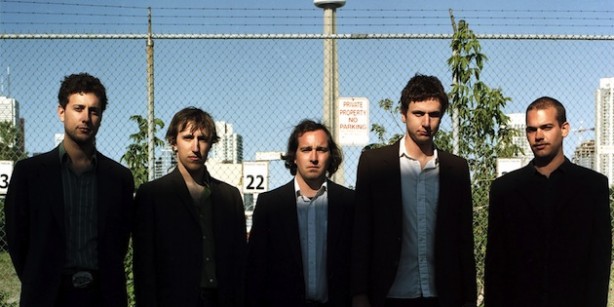 Music
Music
Is the indefinite hiatus the new band breakup?
by Ryan McNutt
February 20, 2014
The Constantines
When is a breakup not really a breakup?
Last weekend, The Walkmen played what may well end up being their final show during the NBA All-Star Weekend in New Orleans. It was a concert added shortly after the band played its reportedly final show in December, which followed bassist/organist Peter Bauer announcing the band has no plans for the future and is heading into a “pretty extreme hiatus.” In that sense, the New Orleans gig was an encore of sorts, a last hurrah that ended with the band performing the first song it ever wrote, “We’ve Been Had,” introduced by singer Hamilton Hamilton Leithauser as, “This is the end. This is the last thing we’ll ever do.”
As one of the best bands of the 2000s was winding down, another was ramping up: on Monday, Constantines vocalist Bry Webb published an essay announcing that the beloved Guelph-bred rock band was reuniting for a series of gigs this year. “There is too much love and too much life in this music for it to only exist in the past,” Webb wrote. So far the band has only one date announced (Toronto’s Field Trip festival), but I wouldn’t be surprised if much of the country gets an opportunity to see one of this country’s most thrilling live outfits for the first time since 2010.
Exciting as the news was, it didn’t take me by surprise. I’d always presumed that I’d see the Constantines again at some point, just as I’m presuming that the Walkmen will be hitting the road again in the future, despite all pretense of finality. By all accounts, neither breakup was on bad terms and, notably, both bands avoided using the “b” word altogether. (The text on the Walkmen’s Wikipedia page even remains present tense; they “are,” not “were.”) Instead, the term used in the case of both bands was “indefinite hiatus.”
Breaking up just ain’t what it used to be.
I only have circumstantial evidence to this effect, but “indefinite hiatus” seems to be the increasingly popular term of choice for bands looking to go their separate ways. Artists like Thee Oh Sees, Wolf Parade, The Wanted, Bloc Party, and others are eschewing the absolutism of “breakup” in favour of a term that is less “goodbye” than “see you someday?” It’s become so popular that it’s getting overused: it was applied to Mumford and Sons for what sounds like a perfectly normal between-albums break, and in the case of Broken Social Scene — whose Kevin Drew certainly loves the dramatics of the hiatus — the old stalwarts have reassembled to headline the Field Trip festival two years in a row now.
And, really, why shouldn’t bands be more cautious in their language around splitting up? We’ve reached the point where the nostalgia economy is in such a boom state that it seems only the most ardent holdouts are unwilling to get the band back together at some point. (Looking at you, Morrissey.) Outkast are this year’s big reunion get, playing nearly the entire festival circuit this summer. After two years of acclaimed solo performances, Jeff Mangum has pulled together the rest of Neutral Milk Hotel and is on the road again. Though The Replacements only have one gig so far this year (Coachella), I wouldn’t be at all shocked to see them make more appearances following three Riot Fest gigs last fall. And though it’s not confirmed yet, reports are that Montreal’s The Unicorns will be reassembling to mark the 10th anniversary of Who Will Cut Our Hair When We’re Gone?
We could add a bazillion other names to this list from recent years: The Pixies, My Bloody Valentine, The Dismemberment Plan, Guided By Voices, Pavement, Mazzy Star, The Postal Service, Death from Above 1979, and so forth. Some of these reunions have produced great records, some have produced mediocre records, but a lot of them haven’t produced any new records at all. Instead, many bands are sticking to the hits, eschewing creation in favour of working the back catalogue.
This may lead to cynical assumptions, like the idea that these reunions are motivated primarily by financial gain. But even if that’s true: is money really so cynical a motivation in many of these cases? The digital era has blown open the music access floodgates and inspired new canonizers like Pitchfork, meaning bands that had small cult followings can now play to much larger audiences and finally profit from their good work. Can we really begrudge these artists for wanting to do so? Besides, there’s a real demand for these shows, and it’s often quite genuine in its motivations. On the one hand, you have listeners who were plugged in during the band’s heyday, looking to relive an experience that meant a lot to them. On the other, you have listeners (often younger) who weren’t there, but who have since caught up. They’re looking to tap into an experience they missed out on.
I’ve been to shows where I’ve been on both sides of this equation, and only rarely did it feel cynical or exploitive. More often, it felt like a shared imagined space: less a vacant simulation than a spirited reconstruction, earnest in its enthusiasm on all fronts. There’s reason to be skeptical of that space: as I enter my 30s, I sometimes fear the quiet creep of nostalgia into my life, in so much as it threatens to displace the predilection for discovery. But at a time when we have so much of the past (both ours and others) available at the touch of a button, can we really begrudge the impulse to play around in it a little bit?
Put another way: yes, I’ll probably be right there beside everyone else at Coachella 2017, presumably headlined by LCD Soundsystem and the White Stripes.
When video circulated of the Walkmen’s final performance, I tweeted that the band’s hiatus made me sad in spite of the fact that I fully expect to be seeing them playing live again within five-to-ten years.
It inspired a Twitter conversation with two friends about how long after a breakup is appropriate for a band to get back together. A few obvious answers leapt to mind — “When there’s an audience for it,” or “When the band feels like it!” — but my gut response was that it depends on how the breakup is framed. From where I was sitting, a general hiatus can end whenever, but an “indefinite hiatus” should last a bit longer (hence, saying five-to-ten years for the Walkmen) and that a breakup might need a good decade or more to sort itself out.
Why did this sort of breakdown make sense to me? Probably because it avoids perceptions of cynicism, of milking a “farewell tour” before returning all-too-soon with the “reunion tour.” It’s likely part of what inspired Mötley Crüe’s decision to formally sign a contract before their yearlong final tour this year, stating that the band will never reunite in the future. They know that audiences have seen artists like Simon and Garfunkel milk farewell tours for years — and they know an assurance of finality will inspire higher ticket sales when fans realize that it’s their last chance to see the band.
And yet, I’m not sure I really believe Crüe: I can picture them at a press conference in 10 years finding some creative way to burn the agreement and hit the road again (or at least, perhaps everyone except Mick Mars, who would be 70 then). In contrast, when R.E.M., one of my favourite bands of all time, went their separate ways in 2011, it felt truly final even without some silly agreement. Their absolutism seemed genuine, whereas Crüe’s absolutism feels forced, and ultimately easy to set aside when, in a decade, the audience and band alike are eager to give the hits one more try.
But these bands are increasingly the exception in saying “goodbye.” The more opaque “indefinite hiatus” — the “see you someday?” with a question mark — is the term de jour, and frankly that’s fine by me. It feels more honest, anyway, more like how a real relationship with real people actually works. Rarely do our friendships end with a bang. More often, we drift apart, or we lose interest in negotiating the tensions between one another. In some cases, it’s often best to just accept that things may always be a bit fractured, held together loosely and thrillingly when it feels right. (I love Emily Haines’ take on the status of Broken Social Scene, as told to Stuart Berman for This Book is Broken: “You can’t break something that’s already broken… The only way you could destroy it would be to actually fix it!”)
Real life, just like music life, is often very indefinite.
Tags: Music, News, Constantines, LCD Soundsystem, Outkast, White Stripes





